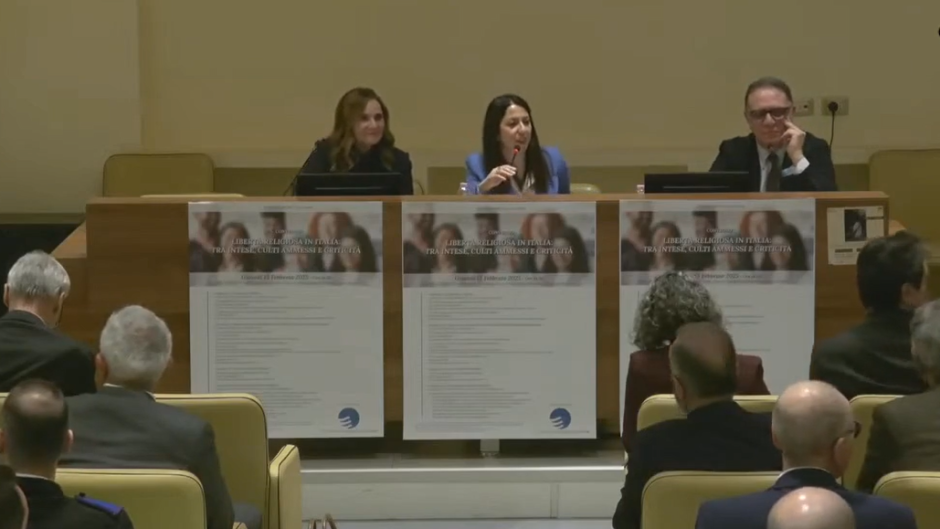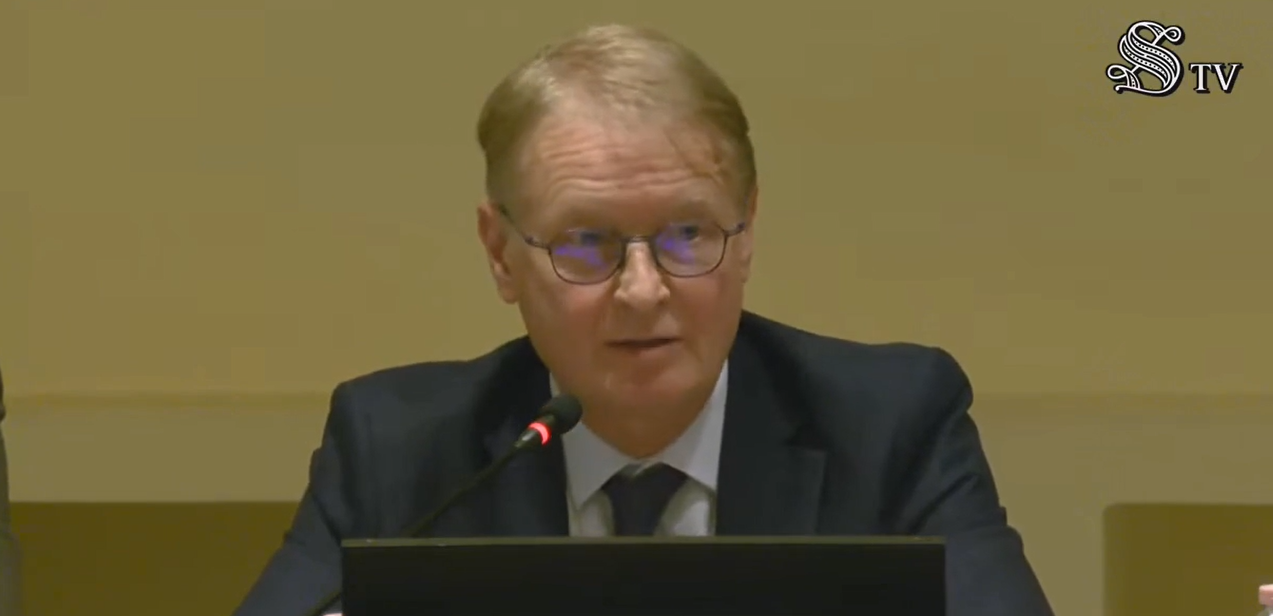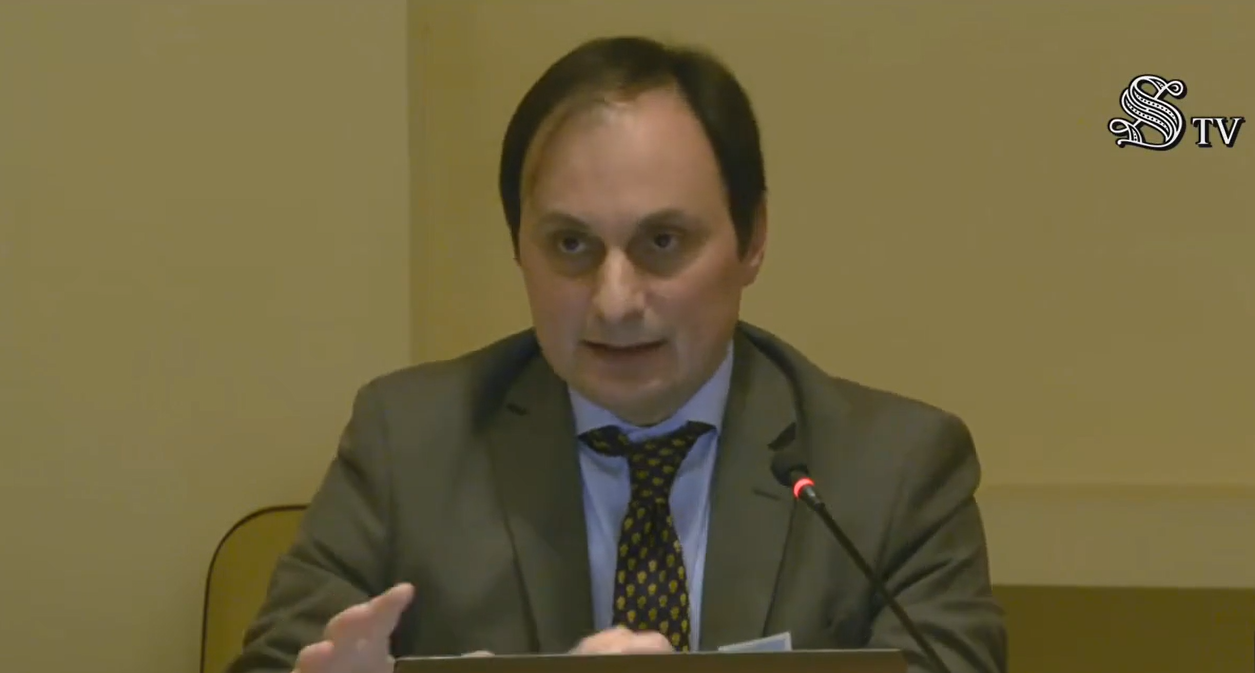Conference on religious freedom in Rome: practices, challenges and the need for a better law
Two senators, a law professor, education experts and many representatives of religious minorities addressed issues and opportunities in Italy at a journey organised by the Italian Evangelical Alliance.
Italian Evangelical Alliance · ROME · 25 FEBRUARY 2025 · 12:00 CET

Religious freedom is an issue that is always on the agenda in Italy, even more than 70 years after the Constitution came into force. Nevertheless, at this stage in the country's public life, it does not seem to be of great interest to public opinion, the media or the political class.
This is why the Italian Evangelical Alliance (AEI) organised a conference on the subject involving numerous personalities from the academic world, politics, evangelical churches and other faith communities.
On 13th February, in a hall of the Italy’s Senate, the conference was introduced by Damaris Marletta, of the AEI’s Religious Freedom Commission, who recalled the Evangelical Alliance’s decades-long commitment to promoting religious freedom in Italy through conferences, demonstrations, marches, documents and assistance offered to evangelical churches.
Barbara Randazzo: new technologies and freedom of conscience
The first report was given by Barbara Randazzo, professor of Constitutional Law and Public Law at the University of Milan. Randazzo began by saying that it is necessary to talk about religious freedom also because of the new challenges it faces with the introduction of new technologies that affect personal freedoms and question the inviolability of the ‘inner forum’ of conscience.
She also recalled the regulatory framework of religious freedom, starting from international declarations and arriving at the Italian Constitution. The freedoms protected at the national level must be interpreted and applied taking into account European and supranational systems within a framework characterised by a ‘positive’ meaning of secularism.
Randazzo observed the constitutional treatment of faith groups in the country, addressing the extension to other faiths of what is provided for the Catholic Church and no longer a ‘tailor-made suit’ for each faith.
Giuseppe Rizza: Teaching of the Catholic religion has become the Catholic teaching of religions
Later, Giuseppe Rizza, School Superintendent of the Autonomous Province of Trento, explored the theme of religious freedom in the context of the school. School is a place where cohesion and pluralism must coexist, he said.
Quoting the words of a young student, Rizza stated that school must be a place where “you can quarrel without getting hurt”. It is necessary to balance identities and the appreciation of diversity.
Examining the way in which Italian schools deal with the subject of religion, Rizza recalled how the teaching of the Catholic religion (IRC), introduced in 1984, was accompanied by the possibility of making alternative choices, thus introducing a potentially competitive mechanism. However, the ‘alternative activities’ have never been adequately structured, remaining an undefined grey area.
Furthermore, added Rizza, who is an evangelical Christian, from teaching of Catholic religion in schools risks becoming the Catholic teaching of all religions, he said.
The speaker said he hoped that the local schools need to develop cultural models of pluralist experience, overcoming rigid and passive attitudes. He emphasised the central role of identity, highlighting a dynamic set of affiliations that are formed and transformed throughout life. Language, territory and historical narrative play a fundamental role in the construction of identity, profoundly influencing the sense of belonging of individuals.
Identity, however, is not free of tension: it can become exclusive and excluding, generating conflicts, or it can be a tool for integration and social cohesion. This is why it is important for schools to promote an open and inclusive vision of identity, capable of contrasting extremism and favouring coexistence in increasingly pluralistic societies, Rizza argued.
Senator Graziano Delrio: The social capital of faith communities
The second session of the journey at the Senate was chaired by Lucia Stelluti, vice-president of the Italian Evangelical Alliance, and saw the contribution of senators Graziano Delrio and Lucio Malan who outlined the contours and open issues of the Italian experience regarding religious freedom.
Delrio, former Undersecretary to the Prime Minister in centre-left governments, began by saying that religious plurality is good for everyone, including the Catholic Church. Faith communities must be free to be themselves in a plural space, even if they have to be perceived as ‘historical forms’.
Quoting Hannah Arendt, he recalled that plurality is the law of the land and that it is people (plural), not man, who inhabit the earth. Human action must be a blessing for all.
Finally, she emphasised the fact that religious communities are a social capital: they have collective aims, create bonds, nurture relationships, develop shared objectives, etc. This system of relationships contributes to forming the soul for democracy and to endowing it with spiritual and ethical foundations without which democracy itself would not stand.
Senator Lucio Malan: Secularism is not state atheism
Senator Lucio Malan began by underlining that religious freedom is the first of all freedoms: when it is endangered, all freedoms are endangered. He also quoted Roger Williams, Baptist pastor and founder of Rhode Island, when he stated that the religious field is the field of the ‘free competition of spirits’.

Senator Lucio Malan speaking at the religious freedom conference on 13 February 2025. Religious freedom, while appealing to great principles, must be applied pragmatically, adapting to concrete situations. Returning to the supreme principle of secularism proper to our Constitution, he argued that secularism is not ‘state atheism’, but recognition by the state of a pluralistic religious space.
To promote religious freedom, it is not always necessary to change the rules, but to make them understood. For faith communities, it should not be an obstacle course, but a journey that is subject to controls and yet passable.
The AEI said both Delrio and Malan have made themselves available to participate in a by-partisan initiative to take up the issue of a possible framework law on religious freedom.
Giacomo Ciccone: A framework law on religious freedom is needed
After the ‘political’ interventions, it was the turn of Giacomo Ciccone, president of the Italian Evangelical Alliance.
Starting with a historical overview, he recalled both the 90th anniversary of the Buffarini Guidi circular against Pentecostals (1935) and the twentieth anniversary of the death of jurist Giorgio Peyrot (1919-2005). Peyrot’s book (Religious Liberty in Italy, 1957) focuses on the decisive points that are still relevant to the Italian situation: the Constitution recognises religious freedom but the concordat regime centred on the Lateran Pacts is out of tune; moreover, formal recognition is one thing, concrete application at a regulatory, administrative, fiscal, etc. level is another.

Giacomo Ciccone, president of the Italian Evangelical Alliance, at the religious freedom conference on 13 February 2025. Furthermore, Ciccone argued that the bilateralism provided for in the Constitution through the instrument of the agreement, while legitimate, does not cover the religious phenomenon in its plurality and complexity. Bilateralism must be an option, not an obligation. It cannot be the only modality for faith communities.
Hence the need for a framework law on religious freedom, which has been awaited for too long. This improvement in the Italian system must be ‘birthed’. In Europe, out of ten countries that have a concordat system similar to the Italian one, only Italy does not have a framework law on religious freedom.
Ciccone concluded with two concrete examples that show how religious freedom is not working: the case of the Breccia evangelical church in Rome (whose premises have not been classified as places of worship due to a lack of ‘objective characteristics’) and that of the Pentecostal evangelical church in Albano, which has been waiting for years to be able to build a place of worship and has had to deal with the disinterested silence of the local administration.
The voice of other faith groups: discrimination and restricted rights
The last session saw a large panel of representatives of different minority religious denominations present in Italy discuss the issue of religious freedom in Italy.
Moderated by Oreste Ponticiello, member of the AEI Religious Freedom Commission, the session revealed some of the critical issues that almost all minority faiths face in a country that, despite proclaiming itself secular, is still perceived as mono-religious.
Giulio Disegni, vice-president of the Union of Jewish Communities, after a report on the relatively long relationship of understanding between the Italian State and the Jewish communities, emphasised the importance of preventing and intervening against antisemitism in particular, but more generally against discriminatory speech or speech inciting to religious hatred.
Imam Abu Bakr Moretta, president of COREIS (Italian Islamic Religious Community), denounced the political and administrative closure that the Islamic community has encountered over the years in not being able to complete the process of agreement with the State. The Imam declared that extremism, from which the official community dissociates itself, cannot be used instrumentally to discriminate and keep out of dialogue a faith with increasingly significant numbers in Italy.
Franco di Maria Jayendranatha, president of the Italian Hindu Union, spoke of a general ignorance of religion in Italy. The lack of knowledge, information and in-depth study of the different faiths can lead to discrimination.
Adriana Pagnani, communications director of the Church of Jesus Christ and Latter-day Saints, identified at least three critical issues that religious minorities encounter in our country: the difficulty in renting, building or using buildings for worship; the impossibility or extreme difficulty in obtaining visas to receive missionaries who do not belong to the majority denomination in the country or to send missionaries abroad; and the communication problem where minorities are the subject of misleading, stereotyped and often discriminatory disinformation, even in official information channels.
Doris Meister, secretary of the Union of Christian Bible Churches, presented the case of the Punto Luce church, which the AEI has been very involved with over time, to underline how, at a local administrative level, there is often a lot of resistance to the ability to freely practice a different religion to the majority one.
The speeches of the Assemblies of God pastor Eliseo Fragnito and that of Michele Passaretti, vice-president of the Evangelical Council, underlined the long history of persecution first and administrative difficulties later that evangelical Christians of different denominations have faced and still face in their relations with the Italian State and its bureaucracy.
The captain of the Salvation Army, Valentina Castaldo, spoke of the the great sensitivity of her international mission to the issue of religious freedom, together with the desire to cooperate together to promote it.
Davide Romano, director of the Adventist Institute of Florence, emphasised that even denominations with agreements with the State have to face bureaucratic-administrative problems due to the substantial lack of protocols or the lack of care in training officials and managers to relate to minorities and their specific needs.
More religious freedom in towns and cities
Enrico Raho, member of the AEI Religious Freedom Commission, concluded the panel by highlighting the faltering application of the protection of religious freedom, not so much at the governmental level, but rather in local institutions and social organisations such as schools and health services. These hostilities and micro-limitations of religious freedom lead to social tensions and discontent that could be dangerous and cause strong social tensions.
AEI’s president Giacomo Ciccone concluded the conference by thanking the participants with the renewed hope of seeing a new season for religious freedom in Italy.
Join us to make EF sustainable
Learn all about our #TogetherInThisMission campaign here (English).
Published in: Evangelical Focus - europe - Conference on religious freedom in Rome: practices, challenges and the need for a better law
